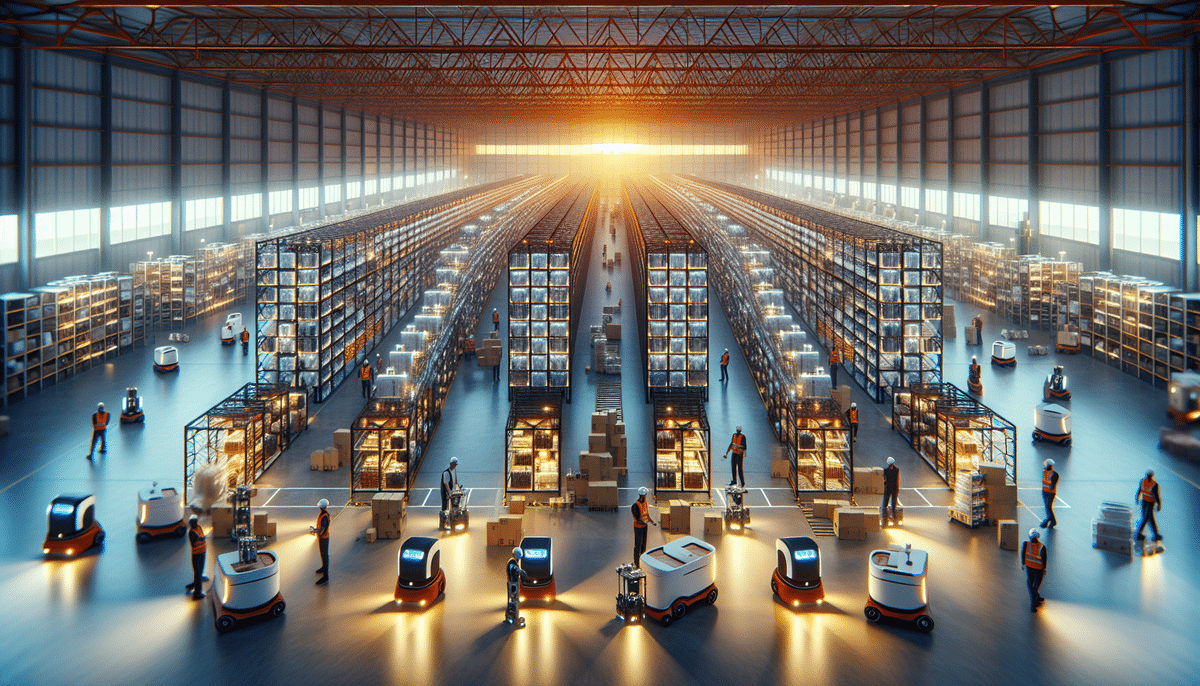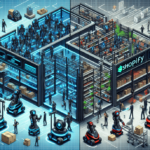AutoStore vs 6 River Systems: Optimizing Shopify Ecommerce Warehouses in 2024
Automated warehouses have become essential components of successful ecommerce operations. By efficiently storing and retrieving products, automated warehouses provide ecommerce businesses with a significant competitive advantage. In this article, we compare two leading automated warehouse systems: AutoStore and 6 River Systems. We evaluate their similarities and differences, explore their features, incorporate recent data and statistics, and examine real-world case studies to help Shopify ecommerce businesses make informed decisions.
Introduction to the Automated Warehouse Market
The evolution of automated warehouse technology has been transformative for various industries. Initially developed to automate manufacturing processes, automation technology quickly found applications in warehousing. According to a McKinsey & Company report, the global warehouse automation market is expected to surpass $30 billion by 2025, driven by the surge in ecommerce and demand for faster order fulfillment.
Modern automated warehouse systems leverage robotics and sophisticated software to streamline order processing, inventory management, and tracking. Key benefits include:
- Reduction in labor costs through automation of repetitive tasks
- Increased efficiency and accuracy in order fulfillment
- 24/7 operational capabilities for faster processing and delivery
- Optimized space utilization allowing more products to be stored in smaller areas
- Reduced risk of product damage due to precise handling
These advantages make automated warehouse systems indispensable for ecommerce businesses aiming to scale efficiently and meet customer expectations.
The Importance of Automated Warehouses in Ecommerce
Ecommerce businesses handle high volumes of orders and products, necessitating efficient inventory management and order fulfillment systems. Automated warehouses offer several advantages that address these needs:
- High Accuracy Rates: Automation minimizes human errors, ensuring that orders are fulfilled correctly.
- Cost Efficiency: Automated systems reduce labor costs and operational expenses compared to traditional warehouses.
- 24/7 Operations: Machines can operate continuously without breaks, significantly increasing throughput.
- Scalability: Automated systems can be tailored to grow with the business, handling increased order volumes seamlessly.
- Versatility: Capable of managing a diverse range of products, from small items to large, bulky goods.
However, implementing an automated warehouse system requires a substantial initial investment in technology and infrastructure. Businesses must consider the costs of equipment, installation, employee training, and maintaining reliable power and internet connections.
Comparative Overview of AutoStore and 6 River Systems
AutoStore is a highly regarded automated warehouse solution known for its high-density storage cube system and efficient robots that extract items from storage. The system maximizes space utilization, allowing businesses to store more products in a compact footprint.
6 River Systems, acquired by Shopify in recent developments, offers a collaborative mobile robot (CMR) system that transports items to and from designated picking and packing stations. Their robots are designed to enhance the picking and packing process by working alongside human workers, improving overall efficiency and accuracy.
Similarities and Differences Between AutoStore and 6 River Systems
While both AutoStore and 6 River Systems aim to streamline warehouse operations, their approaches to automation differ significantly:
Similarities
- Designed to enhance warehouse efficiency and scalability
- Utilize robotics and advanced software for inventory management
- Improve order fulfillment speed and accuracy
Differences
- Automation Approach: AutoStore employs a cube-based storage system, ideal for managing small parts, whereas 6 River Systems utilizes mobile robots for item transport.
- Scalability: AutoStore’s cube system is highly scalable by simply adding more cubes. 6 River Systems' scalability may require additional infrastructure for larger operations.
- Implementation Time: AutoStore typically requires longer implementation due to custom installations. 6 River Systems offers quicker setup with their plug-and-play mobile robots.
Key Features of AutoStore and 6 River Systems
AutoStore Features
- High-density storage cubes for compact space utilization
- Robots designed for fast and accurate picking and packing
- Easy storage capacity expansion by adding more cubes
- Grid-based system for scalability and customization
6 River Systems Features
- Mobile robots that transport items efficiently to picking and packing stations
- Dynamic picking workflows that adapt to order volumes
- Integration with popular ecommerce platforms, enhancing operational synergy
- Real-time data analytics and reporting for informed decision-making
Both systems offer advanced solutions to improve warehouse automation, but they cater to different operational needs based on their unique feature sets.
Performance Comparison: Picking Speed and Efficiency
Performance metrics such as picking speed are crucial for evaluating warehouse systems. According to a St. Onge Company study,:
- AutoStore can complete up to 100 picks per hour.
- 6 River Systems can achieve up to 300 picks per hour.
While AutoStore is praised for its compact design and space efficiency, 6 River Systems’ approach results in higher picking speeds, enhancing overall productivity. However, speed should not be the sole deciding factor; businesses must also consider space utilization and system flexibility.
Cost Efficiency: Which System Offers Better Value?
Cost-effectiveness is a key consideration for businesses investing in warehouse automation. According to a St. Onge Company study, 6 River Systems emerges as the more cost-effective solution primarily because:
- 6 River Systems' mobile robots are less expensive to purchase and maintain.
- Higher throughput rates lead to greater operational efficiency, reducing overall costs.
In contrast, while AutoStore offers significant space optimization, the higher initial setup costs and longer implementation time may result in higher short-term expenses.
Scalability: Handling Increased Order Volumes
Both systems offer scalability, but they cater to different volumes and operational scales:
- AutoStore is well-suited for businesses handling small to medium volume orders with its cube storage system, allowing for easy expansion by adding more cubes as needed.
- 6 River Systems excels in managing large volume orders with its fleet of mobile robots, capable of accommodating complex fulfillment strategies.
However, scaling 6 River Systems may require additional infrastructure investments to support a larger fleet of robots, whereas AutoStore’s modular cube system offers more straightforward scalability.
User Experience: Ease of Implementation and Use
User interface and ease of use are critical for successful implementation:
- AutoStore’s interface is designed for managing small parts efficiently, providing an intuitive user experience that requires minimal training.
- 6 River Systems’ interface, while potentially requiring more initial training, offers robust features and customization options that enhance operational flexibility.
Overall, AutoStore may have a slight advantage in ease of use due to its more straightforward interface, making it a suitable choice for businesses seeking quick adoption and minimal training requirements.
Integration with Shopify: Streamlining Ecommerce Operations
Seamless integration with ecommerce platforms like Shopify is essential for streamlined operations. Both AutoStore and 6 River Systems offer integration capabilities, but their approaches differ:
- AutoStore integrates with Shopify and other ecommerce platforms, allowing for efficient order processing and inventory management.
- 6 River Systems offers a more seamless integration, requiring minimal technical expertise, making it ideal for new ecommerce businesses.
For comprehensive insights on integrating automated warehouse systems with Shopify, refer to industry resources such as the Shopify Blog on Warehouse Automation.
Case Studies: Real-World Implementations of AutoStore and 6 River Systems
AutoStore has been successfully implemented by notable businesses such as:
6 River Systems has been utilized by companies including:
These implementations demonstrate the systems' effectiveness in enhancing warehouse operations, improving order fulfillment rates, and optimizing inventory management.
Choosing the Right Automated Warehouse System for Your Business
Selecting the appropriate automated warehouse system depends on various factors, including warehouse size, budget, and specific operational requirements. Here are key considerations:
- Warehouse Size: Smaller businesses might benefit from AutoStore's compact and scalable cube system, while larger enterprises may find 6 River Systems' mobile robots more suitable.
- Budget: 6 River Systems may offer a more cost-effective solution due to lower initial costs and higher throughput, whereas AutoStore may require a higher investment for equivalent scalability.
- Operational Flexibility: Businesses needing dynamic and adaptable workflows might prefer 6 River Systems, while those prioritizing space optimization may opt for AutoStore.
- Integration Needs: Evaluate which system offers better integration with existing ecommerce platforms and software.
Ultimately, the decision should align with your business’s long-term goals, growth projections, and operational strategies.
Conclusion: The Future of Automated Warehouses in Ecommerce
Automated warehouse technology continues to revolutionize ecommerce operations, offering enhanced efficiency, cost savings, and scalability. Both AutoStore and 6 River Systems provide robust solutions that cater to different business needs, contributing to improved order fulfillment and inventory management.
As ecommerce continues to grow, the importance of efficient and reliable warehouse automation will only increase. Investing in the right automated warehouse system, whether it be AutoStore or 6 River Systems, positions businesses for sustained growth and competitive advantage in the dynamic ecommerce landscape.






















